Governing Mayor of Berlin
| Governing Mayor of Berlin | |
|---|---|
 | |
| Inaugural holder | Ernst Reuter |
| Formation | 11 January 1951 |
| Website | berlin |
The Governing Mayor (German: Regierender Bürgermeister) of Berlin is the head of government, presiding over the Berlin Senate. As Berlin is an independent city as well as one of the constituent States of Germany (Bundesländer), the office is the equivalent of the Ministers President of the other German states, except the states of Hamburg and Bremen, where the heads of government are called "First Mayor" and "President of the Senate and Mayor", respectively. The title Governing Mayor of Berlin is the equivalent of Lord Mayor in the meaning of an actual executive leader.

According to the Berlin Constitution, the Governing Mayor is member and head of the Berlin Senate. The ministers are called senators. The two deputies additionally hold the title of Mayor (German: Bürgermeister, historically: burgomaster). The title Mayor is also held by the heads of the twelve boroughs of Berlin, although they do not actually preside over self-governmental municipalities.
The Governing Mayor is elected by the city's state parliament, the Abgeordnetenhaus of Berlin (equivalent to the Landtag of other federal states), which also controls their policy guidelines and is able to enforce resignation by a motion of no confidence. The Governing Mayor is entitled to appoint and release the senators of the government.
The seat of the Senate is the city hall Rotes Rathaus in Mitte.
History[]
As capital of the Kingdom of Prussia, Berlin received its first Lord Mayor (Oberbürgermeister) according to the Prussian reforms after the retreat of the Napoleonic occupation troops in 1809, approved by King Frederick William III. He served as head of the city council called Magistrat. The two-stage administration and the office of the boroughs' mayors were implemented in the course of the wide-ranging incorporations by the 1920 Greater Berlin Act.
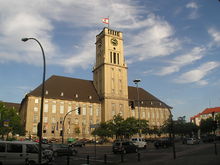
During the Allied occupation after World War II, the city assembly (Stadtverordnetenversammlung) elected the Social Democratic politician Ernst Reuter as Lord Mayor on 24 June 1947, who, however, did not obtain the affirmation by the Allied Kommandatura of Berlin[1] due to Soviet reservations. Following the Communist putsch in Berlin's city government in September 1948, a separate city parliament (still named Stadtverordnetenversammlung von Groß-Berlin) was set up, however, de facto only competent for the western occupation sectors of what was to become West Berlin was elected on 5 December 1948, electing two days later a separate city government and Ernst Reuter Lord Mayor for West Berlin. The Soviet administration had officially deposed the previous elected government for all of Berlin with effect only in the eastern sector and had installed the SED Lord Mayor Friedrich Ebert, Jr. in East Berlin already on 30 November 1948.

West Berlin introduced its own constitution (Verfassung von Berlin), accounting for the changed facts, with effect of 1 October 1950. This constitution provided for the renaming of the city parliament to "Abgeordnetenhaus von Berlin", of the city government into "Senate of Berlin" and the head of government into "Governing Mayor of Berlin".[2] Following the new constitution representatives were elected on 3 December 1950 and the new parliament re-elected Ernst Reuter as head of city government on 18 January 1951, with Reuter then adopting the new title. From 1951 to 1990, during the Cold War, the Governing Mayor was the head of government in West Berlin with his seat at Rathaus Schöneberg, while East Berlin de jure remained under Soviet occupation and de facto became a part and capital of the East Germany — not recognized by the NATO members, but actually condoned by the 1971 Four Power Agreement on Berlin and the German Basic Treaty of 1972.
The government of West Berlin claimed to be the legitimate government for all of Berlin within the borders established by the 1920 Greater Berlin Act until the Peaceful Revolution of 1989. Even before German reunification on 3 October 1990, the West Berlin Governing Mayor and the East Berlin Oberbürgermeister held common cabinet meetings, until Berlin-wide elections took place on 2 December 1990.
The following list of mayors of Berlin shows all the mayors (Oberbürgermeister, Regierender Bürgermeister) of Berlin, Germany since 1809:
List of mayors of Berlin[]
Napoleonic Empire (1806–1809)[]
In 1806 the French occupants gathered 2,000 wealthy Berliners in St. Peter's Church, Berlin, in order to elect the Grand conseil (grand council) of sixty members again electing the Comité administratif (administrative committee). This body of seven elected burghers was the provisional city government competent to carry out the orders of the occupation power, especially to raise the French war contributions by levying them mostly from the 2,000 eligible voters. The président of the committee was the Berlin-based Prussian publisher:[3]
- (1806–1809; *1756–1824*)
Prussia/Germany (1809–1935)[]
- (1809–1813)
- (1814–1832)
- (1832–1834)
- Heinrich Wilhelm Krausnick (1834–1848)
- (1848–1851)
- Heinrich Wilhelm Krausnick (1851–1862)
- (1863–1872)
- Arthur Hobrecht (1872–1878)
- Max von Forckenbeck (1878–1892)
- (1892–1898)
- (1899–1912)
- (1912–1920)
- (1921–1929)
- (1929–1931)
- Heinrich Sahm (1931–1935)
Nazi Germany (1935–1945)[]
The Nazi government introduced a new unitary municipal ordinance for all German municipalities and cities accounting for the de facto abolition of municipal democracy and autonomy since the Nazi takeover in 1933. According to the new ordinance the administrative head of the city was now titled Stadtpräsident (City President). The Oberbürgermeister remained in a ceremonial role.
| No. | Portrait | Lord Mayor | Took office | Left office | Political party |
|---|---|---|---|---|---|
| 1 | 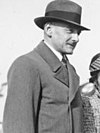
|
19 December 1935 | 5 January 1937 | German People's Party | |
| 2 | 
|
Julius Lippert | 5 January 1937 | July 1940 | National Socialist German Workers' Party |
| 3 | Ludwig Steeg | July 1940 | 2 May 1945 | National Socialist German Workers' Party |
Allied occupation (1945–1948)[]
Following Berlin's provisional post-war constitution, enacted under quadripartite Allied rule, the head of city government was titled again Oberbürgermeister (generally "Lord Mayor").
| No. | Portrait | Lord Mayor | Took office | Left office | Political party |
|---|---|---|---|---|---|
| 1 | 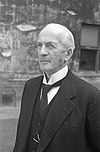
|
Arthur Werner | 17 May 1945 | 10 December 1946 | Non-partisan |
| 2 | 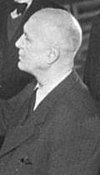
|
Otto Ostrowski | 10 December 1946 | 11 June 1947 | Social Democratic Party |
| 3 | 
|
Louise Schroeder[4] | 11 June 1947 | 7 December 1948 | Social Democratic Party |
| 4 | 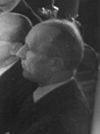
|
Ferdinand Friedensburg[5] | 14 August 1948 | 1 December 1948 | Christian Democratic Union |
German Democratic Republic (1949–1990)[]
| Portrait | Name (Birth–Death) |
Term of office | Political party | |||
|---|---|---|---|---|---|---|
| Took office | Left office | Days | ||||
| East Berlin (1948–1990) | ||||||
| 1 | 
|
Friedrich Ebert Jr. (1894–1979) |
30 November 1948 | 5 July 1967 | 6791 | Socialist Unity Party |
| 2 | 
|
Herbert Fechner (1913–1998) |
5 July 1967 | 11 February 1974 | 2413 | Socialist Unity Party |
| 3 | 
|
Erhard Krack (1931–2000) |
11 February 1974 | 15 February 1990 | 5848 | Socialist Unity Party |
| – | 
|
Ingrid Pankraz (born 1948) Acting |
15 February 1990 | 23 February 1990 | 8 | Party of Democratic Socialism |
| 4 | 
|
Christian Hartenhauer (born 1948) |
23 February 1990 | 30 May 1990 | 96 | Party of Democratic Socialism |
| 5 | 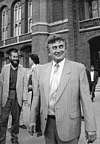
|
Tino Schwierzina (1927–2003) |
30 May 1990 | 3 October 1990 | 126 | Social Democratic Party in the GDR |
| East Berlin was reunited with West Berlin on October 3, 1990 and dissolved. | ||||||
Federal Republic of Germany (1949–present)[]
Political party: SPD CDU
| Portrait | Name (Birth–Death) |
Term of office | Political party | |||
|---|---|---|---|---|---|---|
| Took office | Left office | Days | ||||
| West Berlin (1948–1990) | ||||||
| 1 | 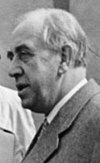
|
Ernst Reuter (1889–1953) |
7 December 1948 | 29 September 1953 | 1757 | Social Democratic Party |
| 2 | 
|
Walther Schreiber (1884—1958) |
29 September 1953 | 11 January 1955 | 469 | Christian Democratic Union |
| 3 | 
|
Otto Suhr (1955–1957) |
11 January 1955 | 30 August 1957 (died in office) |
962 | Social Democratic Party |
| – | 
|
Franz Amrehn (1911–1981) Acting |
30 August 1957 | 3 October 1957 | 34 | Christian Democratic Union |
| 4 | 
|
Willy Brandt (1913–1992) |
3 October 1957 | 1 December 1966 | 3346 | Social Democratic Party |
| 5 | 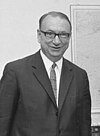
|
Heinrich Albertz (1915–1993) |
1 December 1966 | 19 October 1967 | 322 | Social Democratic Party |
| 6 | 
|
Klaus Schütz (1926–2012) |
19 October 1967 | 2 May 1977 | 3483 | Social Democratic Party |
| 7 | 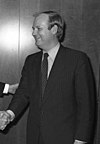
|
Dietrich Stobbe (1938–2011) |
2 May 1977 | 23 January 1981 | 1362 | Social Democratic Party |
| 8 | 
|
Hans-Jochen Vogel (1926–2020) |
23 January 1981 | 11 June 1981 | 139 | Social Democratic Party |
| 9 | 
|
Richard von Weizsäcker (1920–2015) |
11 June 1981 | 9 February 1984 | 973 | Christian Democratic Union |
| 10 | 
|
Eberhard Diepgen (born 1941) |
9 February 1984 | 16 March 1989 | 1862 | Christian Democratic Union |
| 11 | 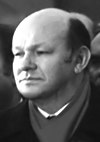
|
Walter Momper (born 1945) |
16 March 1989 | 3 October 1990 | 566 | Social Democratic Party |
| West Berlin was reunited with East Berlin on October 3, 1990 and dissolved. | ||||||
| Reunified Berlin (1990–present) | ||||||
| 11 & 12 | 
|
Walter Momper (born 1945) & Tino Schwierzina[6] (1927–2003) |
3 October 1990 | 24 January 1991 | 113 | Social Democratic Party |
| (10) | 
|
Eberhard Diepgen (born 1941) |
24 January 1991 | 16 June 2001 | 3796 | Christian Democratic Union |
| 13 | 
|
Klaus Wowereit (born 1953) |
16 June 2001 | 11 December 2014 | 4926 | Social Democratic Party |
| 14 | 
|
Michael Müller (born 1964) |
11 December 2014 | Incumbent | 2468 | Social Democratic Party |
See also[]
Notes and references[]
- ^ The Allied control body for Berlin corresponding to the Allied Control Council for the rest of Germany.
- ^ Cf. articles 25 and 40 of Die Verfassung von Berlin (Constitution of Berlin [West]), Berlin (West): Landeszentrale für politische Bildungsarbeit Berlin, 1982, pp. 34 and 37.
- ^ Cf. Werner Gahrig, Unterwegs zu den Hugenotten in Berlin. Historische Spaziergänge, extended and corrected ed., Berlin: edition ost/Das Neue Berlin, 22000, p. 83. ISBN 3-360-01013-2
- ^ Schroeder replaced the Lord Mayor-elect Ernst Reuter, who was barred by Soviet veto.
- ^ Acting for Schroeder.
- ^ German Reunification Treaty, Artikel 16
External links[]
| Wikimedia Commons has media related to Governing mayors of Berlin. |
- Mayors of Berlin


